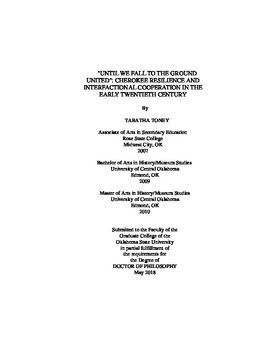| dc.contributor.advisor | Bryans, William S. | |
| dc.contributor.author | Toney, Tabatha | |
| dc.date.accessioned | 2019-03-25T21:59:32Z | |
| dc.date.available | 2019-03-25T21:59:32Z | |
| dc.date.issued | 2018-05 | |
| dc.identifier.uri | https://hdl.handle.net/11244/317770 | |
| dc.description.abstract | "'Until We Fall to the Ground United': Cherokee Resilience and Interfactional Cooperation in the Early Twentieth Century," chronicles the political history of the Cherokee tribal government from 1906 to 1950. After the 1898 Curtis Act eventually abolished the recognition of the Cherokee and other tribal governments in 1906, the Cherokees put aside the nearly one hundred years of sometimes violent factionalism to retain their autonomy. Coming together under the Keetoowah, the tribe reorganized under a new constitution and charter according to the Oklahoma Indian Welfare Act passed in June 1936. | |
| dc.description.abstract | Before the twentieth century, tribal factionalism enabled the US to interfere in tribal affairs beyond enforcing its Indian polices. Beginning with removal to the West, the US signed the Treaty of New Echota with the party most favorable to the officials' goals. After the Trail of Tears in the 1830s, violent retribution for removal and a dispute on the official government of the tribe led to the US intervention and Treaty of 1846. Opposing sides were chosen again in the American Civil War, causing a harsh Treaty of 1866 that damped self-determination even further. Disagreement occurred after the Dawes Act and allotment was forced on all in the tribe. | |
| dc.description.abstract | However, with the Curtis Act and dissolution of tribal government in 1906, those divided were able to work together peacefully because they had few other options. The tribe found itself without a way to govern themselves and submit claims and complaints to the US. The splintered factions united in the 1920s and along with the terms of the Oklahoma Indian Welfare Act served as a successful, single, federally-recognized, authoritative tribal body: Keetoowah Incorporated, followed by the United Keetoowah Band. This coalition continued, albeit with some conflict, until the 1970s and the rewriting of the Cherokee constitution that divided the Cherokees into two governments that exist today. | |
| dc.format | application/pdf | |
| dc.language | en_US | |
| dc.rights | Copyright is held by the author who has granted the Oklahoma State University Library the non-exclusive right to share this material in its institutional repository. Contact Digital Library Services at lib-dls@okstate.edu or 405-744-9161 for the permission policy on the use, reproduction or distribution of this material. | |
| dc.title | "Until we fall to the ground united": Cherokee resilience and interfactional cooperation in the early twentieth century | |
| dc.contributor.committeeMember | Miller, Douglas | |
| dc.contributor.committeeMember | Smith, Lindsey | |
| dc.contributor.committeeMember | Arata, Laura | |
| osu.filename | Toney_okstate_0664D_15737.pdf | |
| osu.accesstype | Open Access | |
| dc.type.genre | Dissertation | |
| dc.type.material | Text | |
| thesis.degree.discipline | History | |
| thesis.degree.grantor | Oklahoma State University | |
